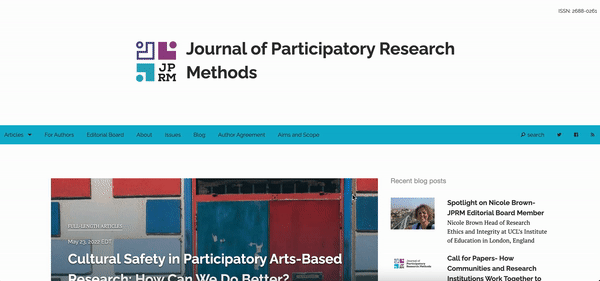
Researchers are more likely to visit and frequent journal websites that provide relevant search results fast.
At Scholastica, we get that, and it’s why we’re continually introducing improvements to optimize the Scholastica Open Access Journal Publishing Platform for web browsers and on-site search. This month, we have an exciting update to share — we’ve added advanced on-site article search functionality to all journal websites hosted via Scholastica. Read on for the details!
Introducing advanced article search

Now, when readers visit a journal website hosted via Scholastica and click “search” in the top navigation bar, they’ll see a new option to use “advanced search” to look for articles (as shown above). When selected, the advanced search feature enables users to set granular specifications for the kinds of articles they’re interested in to conduct more targeted searches, including the ability to search for articles:
- By a specific author or authors
- Nested under a particular journal section (with auto-complete for all applicable article sections in the journal)
- That do or do not contain specific words/phrases in the title
- That do or do not include specific keywords (with auto-complete for all applicable keyword options for the journal)
- That do or do not contain specific words/phrases in the abstract
- Published after a given date or within a set date range
Readers can apply any one or a combination of the above advanced search specifications to drill down their results as much as they like, with the option to view results starting with the oldest or most recent content.
The new advanced search functionality is designed to assist readers who know exactly the kinds of articles (or particular article) they’re searching for to quickly get to those results, as well as to help those browsing journal websites hone in on content of potential interest to them.
For example, a reader visiting a technology journal website might specify that they’re interested in articles that include the keywords “Artificial Intelligence” and “Machine Learning” and were published after January 1, 2023, to see only the most current content on those subjects. If that reader wanted to narrow it down even further to ensure those keywords are central to the topic of all the article search results they receive, they could add the specification that the article Abstract should contain either or both keywords.
The new advanced article search features are sure to prove especially useful for readers of journals with substantial back issues and/or large publication volumes. And, as all journal content stores grow, advanced search will provide increasing and lasting returns, making it possible for readers to browse journal content using as broad or specific parameters as they need to find relevant articles fast.
Part of ongoing search support
The new advanced search feature is part of our continual work to optimize journal websites hosted via Scholastica for on-site and off-site search. Among ways we’ve optimized journal websites for external search engines include:
- Ensuring all website pages are mobile-friendly and regularly introducing website speed improvements (both key factors in search engine result rankings)
- Structuring journal websites and metadata to support Google Scholar indexing
- Offering integrations with Crossref’s DOI registration service and leading archives and indexes, including Portico, the Directory of Open Access Journals, and PubMed Central
You can learn more about all the features available with Scholastica’s OA Journal Publishing Platform for hosting journal websites, tracking readership analytics, content indexing, and more in this blog post.
If you want to see Scholastica’s OA Journal Publishing Platform in action to determine if it’s the right fit for your publishing needs, you can also schedule a demo with a member of our team.





![Everything you need to know about Scholastica's OA journal publishing analytics [updated with new features]](https://i.imgur.com/RlEtzO4m.png)


